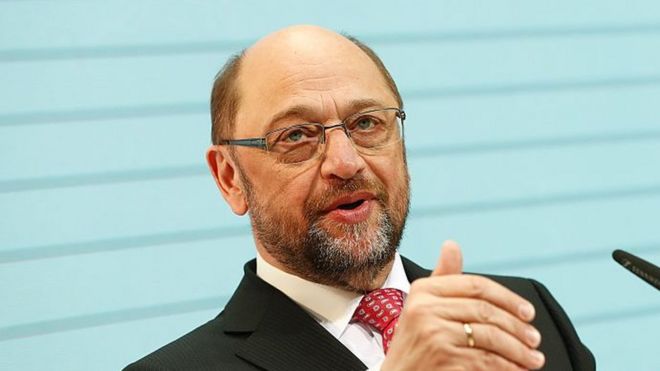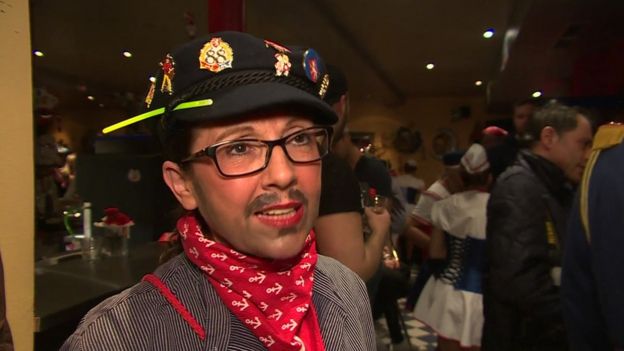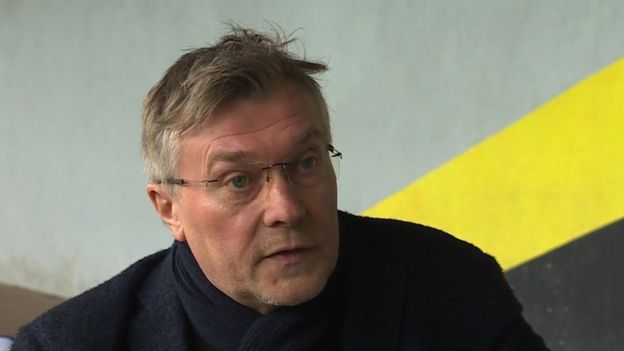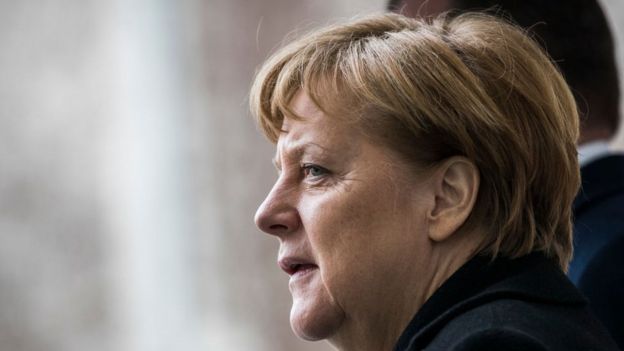Could this man be the next chancellor of Germany?
Who is Martin Schulz?
- 24 February 2017
- Europe
 GETTY IMAGES
GETTY IMAGES
In a smoky, hot room behind a pub, sequinned dancers and men in white breeches march through a cheering costumed crowd. Up on the stage, resplendent in a sparkling tricorn hat, the king of the revels holds court.
It is carnival season in an election year. German politics has its new prince too. And Martin Schulz might just take Angela Merkel's crown.
"I think he's good for his party," Elke shouts to be heard over the music. "He's close to the people. I actually like him but he still has to prove that he can lead Germany the way Merkel has."
A man dressed as a pirate leans in. "Angela would be the better chancellor. She has more experience," he says. "I'd be happy if Martin Schulz went into coalition with her. The two of them could bring Europe forward."
His critics say he is more Brussels than Berlin. MEPs have raised questions in the European Parliament about its former president's EU expenses and conduct. But they have failed to damage his bid for Germany's top job. Mr Schulz is recasting himself as a man of the people.

And in his home town of Wuerselen in western Germany - near the border with Belgium and the Netherlands - where he once served as mayor, plenty say it is his authenticity, his ability to understand the everyday lives of the electorate, that make him so appealing to voters.
Recent polls suggest that, given a choice between Mr Schulz and Mrs Merkel, he would be Germany's preferred chancellor.
Who is Martin Schulz?
- Born 20 December 1955, in Hehlrath, western Germany
- Trained as a bookseller, owning a bookshop from 1982 to 1994
- Joined the German Social Democratic Party in 1974, served as a local councillor and mayor
- MEP from 1994-2017, president of the European Parliament, 2012-17
- Social Democrat candidate for German chancellor, 2017
As we walk across the soggy football pitch in this former mining town, one of his childhood friends recalls the days when crowds of 20,000 would come to watch the local club play. As teenagers, Franz-Josef Hansen tells me, he and Mr Schulz were good footballers. But an injury put paid to his team-mate's dreams of professional glory.
"As a football player," he says, "he wasn't the best technician but he had lots of characteristics which make a good politician. He was a team player, he encouraged us, drove us, he was very focused and very independent. His willpower drove us to success even against superior teams."
Mr Schulz left school with no qualifications and beat an alcohol addiction before entering local politics. Many think that biography, his apparent ability to overcome adversity, contributes to his popular appeal.

But there is another reason too. After 12 years as its chancellor, Germany is, some say, simply fed up with Mrs Merkel. There's even a phrase for it - "Merkel muede" or Merkel tiredness. For years there has been no realistic alternative, until now.
Mr Schulz is a relative novelty on the domestic political scene and that, according to Christian Rein, a senior journalist at the Aachener Zeitung, may go some way to explaining why, a month after he announced his candidacy, he is still riding high in the polls, his Social Democrats neck-and-neck with Mrs Merkel's Conservatives.
- Chancellor Merkel: Germany's shrewd survivor
- Germany's rising tide of populism
- What does Alternative for Germany (AfD) want?
"I'm a bit surprised," he says, "that it's still going on, this impact he has, but it's still a long time until the elections in September and I think it's going to be hard for the Social Democrats to keep that running."
Mr Schulz has yet to unveil a manifesto but he has promised generous, and controversial, welfare reforms. A future coalition of the left is no longer out of the question, although commentators point out that it may be difficult to smooth over fundamental differences with some of the smaller parties. The left wing party, Die Linke, for example, urges the dissolution of Nato.

And under his leadership his Social Democrats also appear to be diluting the impact of the right wing party Alternative for Germany (AfD), which has begun to slump in the polls.
"With Martin Schulz, the political competition has returned," explains Achim Grossman, a senior Social Democrat in Wuerselen. "We've missed that in the last few years. We have a re-politicised society - a process that he's driving. That will help make the parties more distinct."
A month ago it was possible to predict, with some certainty, that Mrs Merkel would win the September election, albeit having taken a hammering from the AfD. Now, for the first time in years, she faces significant opposition from a different political direction.
Germany, like much of Europe, appeared to be edging to the right. Now it is just as likely to turn instead to the left.
It is a shift almost as unexpected as the fantastical costumes of carnival which will shimmer and dance through Germany's streets in the coming days. And, after a year of global political surprise, there is a sense here too now that anything could happen.
Watch Jenny Hill's profile of Martin Schultz for the BBC's 100 Days programme, via BBC iPlayer.
Comments